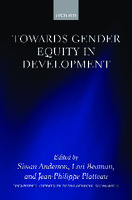Towards Gender Equity in Development
| dc.contributor.editor | Anderson, , and , Siwan | |
| dc.contributor.editor | Beaman, Lori | |
| dc.contributor.editor | Platteau, Jean-Philippe | |
| dc.date.accessioned | 2019-05-13 14:42:31 | |
| dc.date.accessioned | 2020-04-01T10:27:26Z | |
| dc.date.available | 2020-04-01T10:27:26Z | |
| dc.date.issued | 2019 | |
| dc.identifier | 1004968 | |
| dc.identifier | OCN: 1135853666 | en_US |
| dc.identifier.uri | http://library.oapen.org/handle/20.500.12657/25125 | |
| dc.description.abstract | As a result of widespread mistreatment and overt discrimination in all dimensions of their lives, women lack significant autonomy. The central preoccupation of this book is to explore key sources of female empowerment and discuss the current challenges and opportunities for the future. Schematically, three main domains are distinguished. The first is marriage and women’s relative bargaining position within the household. Since in developing countries marriage is essentially universal and generally arranged by the parents, women have little say in the choice of their partner and largely depend on their husband for their livelihoods and well-being. How marriage, divorce, and remarriage practices have evolved and with what effects for women, is therefore of crucial concern. The second domain is the set of options available to women outside of marriage and in the context of their community. Given the importance of household dynamics in determining female well-being, a crucial step towards women’s empowerment consists of improving such options, economic and collective action opportunities in particular. The third domain belongs to the realm of over-arching discriminatory laws and cultural norms. Can the government acting as lawmaker contribute to modifying norms and practices that disadvantage women? Or, to be effective, do legal moves need to be complemented by other initiatives such as the expansion of economic opportunities for women? Do discriminatory social norms necessarily dissolve with improved legal status for women? These questions, and other related issues, are tackled from different perspectives, by top scholars with well-established experience in gender-focused economic and social research. | |
| dc.language | English | |
| dc.relation.ispartofseries | WIDER Studies in Development Economics | |
| dc.subject.classification | thema EDItEUR::J Society and Social Sciences::JB Society and culture: general::JBF Social and ethical issues::JBFA Social discrimination and social justice | en_US |
| dc.subject.classification | thema EDItEUR::J Society and Social Sciences::JB Society and culture: general::JBS Social groups, communities and identities::JBSF Gender studies, gender groups | en_US |
| dc.subject.classification | thema EDItEUR::J Society and Social Sciences::JH Sociology and anthropology::JHB Sociology::JHBK Sociology: family and relationships | en_US |
| dc.subject.classification | thema EDItEUR::K Economics, Finance, Business and Management::KC Economics | en_US |
| dc.subject.classification | thema EDItEUR::K Economics, Finance, Business and Management::KC Economics::KCF Labour / income economics | en_US |
| dc.subject.classification | thema EDItEUR::K Economics, Finance, Business and Management::KC Economics::KCM Development economics and emerging economies | en_US |
| dc.subject.other | female empowerment | |
| dc.subject.other | marriage | |
| dc.subject.other | female well-being | |
| dc.subject.other | discriminatory laws and cultural norms | |
| dc.subject.other | social norms | |
| dc.title | Towards Gender Equity in Development | |
| dc.type | book | |
| oapen.identifier.doi | 10.1093/oso/9780198829591.001.0001 | |
| oapen.relation.isPublishedBy | b9501915-cdee-4f2a-8030-9c0b187854b2 | |
| oapen.relation.isFundedBy | c9be6ad3-6692-452d-a1f3-a3e6c74f0fe2 | |
| oapen.relation.isbn | 9780198829591 | |
| oapen.pages | 448 | |
| oapen.place.publication | Oxford, UK | |
| oapen.identifier.ocn | 1135853666 |

